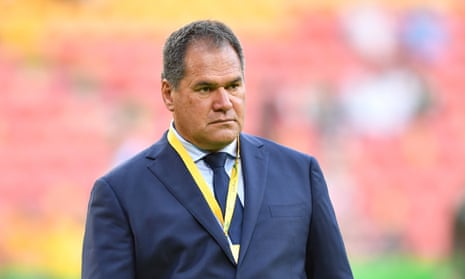Wallabies coach Dave Rennie has questioned the logic of World Rugby’s new measures to curb injury that include a full-contact training cap of 15 minutes per week.
The fresh guidelines, formed after a study that involved 600 players from around the world as well as medical, conditioning and performance professionals, also recommended no more than 40 minutes of controlled contract training and 30 minutes of set-piece work each week.
The study found that between 35-40% of injuries occur during training and that a drop from about 21 minutes of full-contact training currently averaged would have positive spin-offs on injury and short and long-term player welfare.
According to a World Rugby statement the recommendations, which are not mandatory, attempt to “strike a balance” so players, particularly those moving between country and club, can be prepared to perform but avoid an elevated injury risk at the same time.
Rennie estimated the Wallabies did eight minutes of contact work on Tuesday, but said a 15-minute weekly cap could prove tough to police and detrimental to the overall goal.
“Who’s timing it? I’m sure there’s a lot of work going into coming up with these numbers but I’m not certain how that will pan out,” he said before Saturday’s Rugby Championship clash with Argentina.
“Thirty-five to 40% of injuries happen at training, which means 60 to 65 happen at games. And you have to make sure from a training point of view you’re getting the conditioning and contact load into them so that that they can deal with it on game day and have the technique required.
“There’s focus around reducing injuries but the most important thing is ensuring our athletes have the skills and knowledge to deal with the contact.”
The change, which follows the NFL’s decision to place limits on full-contact training in 2011, is World Rugby’s latest effort to make the sport safer.
Tougher officiating of high and dangerous contact in tackles and collisions continues to be a talking point at all levels, with players now aware a red card and lengthy suspension is likely for any contact to an opponent’s head.
World Rugby director of rugby and high performance Joe Schmidt, who coached Ireland, and former All Blacks centre Conrad Smith, now International Rugby Players head of player welfare, both said the 15-minute limit would have been irrelevant in their experience.
“While there is a lot less full-contact training than many people might imagine, it is our hope that having a central set of guidelines will further inform players and coaches of key considerations for any contact that is done during training,” Schmidt said.
Quick GuideHow do I sign up for sport breaking news alerts?
Show
- Download the Guardian app from the iOS App Store on iPhone or the Google Play store on Android by searching for 'The Guardian'.
- If you already have the Guardian app, make sure you’re on the most recent version.
- In the Guardian app, tap the Menu button at the bottom right, then go to Settings (the gear icon), then Notifications.
- Turn on sport notifications.
“We recognise that community level rugby can be an almost entirely different sport in terms of fitness levels, resources and how players can be expected to train, but the guidelines can be applied at many levels, especially the planning, purpose and monitoring of any contact in training.”
Meanwhile, Sean McMahon’s much-hyped Wallabies return won’t come in Townsville on Saturday, with flanker Rob Leota instead in line for his first Test start. James O’Connor is a chance of playing his first Test this year though, named on the bench in a return from a groin injury as backline cover behind the resurgent Quade Cooper.
Versatile back Reece Hodge has beaten O’Connor to the fullback spot vacated by the injured Tom Banks in the other change to the side that beat South Africa on Saturday. Much has been made of the Japan-based McMahon’s impact since joining the squad earlier this month but his first Test start since 2017 continues to elude him.
Fellow backrower Harry Wilson, who featured in every Test last year, also continues his wait for more action. Instead Leota will replace Lachie Swinton in the No.6 to play Argentina after a strong cameo off the bench in his debut last weekend.
Wallabies squad to play Argentina: Reece Hodge, Andrew Kellaway, Len Ikitau, Samu Kerevi, Marika Koroibete, Quade Cooper, Nic White, Rob Valetini, Michael Hooper (c), Rob Leota, Matt Philip, Izack Rodda, Taniela Tupou, Folau Fainga’a, James Slipper. Bench: Feleti Kaitu’u, Angus Bell, Tom Robertson, Darcy Swain, Pete Samu, Tate McDermott, James O’Connor, Jordan Petaia
